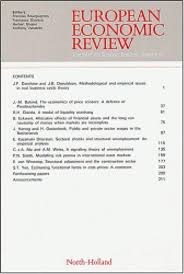
Galeotti, A. and Moraga-González, J.L. (2009). Platform intermediation in a market for differentiated products European Economic Review, 53(4):417--428.
-
Affiliated author
-
Publication year2009
-
JournalEuropean Economic Review
We study a two-sided market where a platform attracts firms selling differentiated products and buyers interested in those products. In the subgame perfect equilibrium of the game, the platform fully internalises the network externalities present in the market and firms and consumers all participate in the platform with probability one. The monopolist intermediary extracts all the economic rents generated in the market, except when firms and consumers can trade outside the platform, in which case consumers obtain a rent that corresponds to the utility they would get if they did trade outside the platform. The market allocation is constraint-efficient in the sense that the monopoly platform does not introduce distortions over and above those arising from the market power of the differentiated product sellers. An increase in the number of retailers increases the amount of variety in the platform but at the same time increases competition. As a result, the platform lowers the firm fees and raises the consumer charges. In contrast, an increase in the extent of product differentiation raises the value of the platform for the consumers but weakens competition. In this case, the platform raises both the charge to the consumers and the fee for the firms.